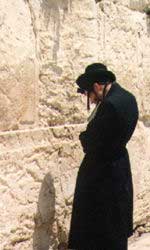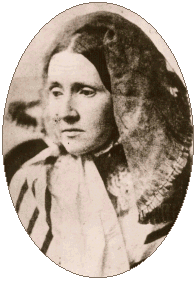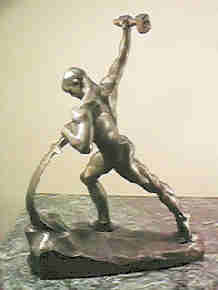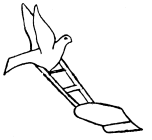
(Matthew 16:13-23)
May these words of this Peter be like a rock,
not a stumbling block!
|
|
"Who do you say
that I am?" Jesus asked. Simon Peter answered, "You
are the Messiah, the Son of the living God." And Jesus
answered, "Blessed are you, Simon son of Jonah! ... You are
Peter (petros), and on this rock (petra)
I will build my church..." Jesus then began to speak of
the rough road ahead. And Peter took him aside and rebuked him... "Get
behind me, Satan!" Jesus replied. "You are a stumbling
block..." (Matthew 16:13-23) May these words of this Peter be like a rock, |
"Plowshare Prayer"
Message preached December 2,
2001
Long Green Valley Church of the Brethren
Glen Arm, Maryland USA
based upon Psalm
122 and Isaiah
2:1-5
Early on
in life weíre able to believe amazing things. Take all this "Santa
Claus" stuff. Built upon the legend of St. Nicolas, the faithful - that is,
children - believe that on Christmas Eve this fellow visits every home around
the world,  bestowing
presents along the way. Not only that, but this bearded guy seems to be
everywhere this month, ringing bells above thousands of Salvation Army kettles,
as well as nestling little ones in his lap at every mall listening to their
heartsí desires. They actually believe something happens between the
whispering of their wish lists into his ear and the presents that appear under
their tree on Christmas morning.
bestowing
presents along the way. Not only that, but this bearded guy seems to be
everywhere this month, ringing bells above thousands of Salvation Army kettles,
as well as nestling little ones in his lap at every mall listening to their
heartsí desires. They actually believe something happens between the
whispering of their wish lists into his ear and the presents that appear under
their tree on Christmas morning.
Somehow, along the way of growing into adults, we let go of this belief. Perhaps it has something to do with the fact that Santa doesnít always look the same every place we see him. Sometimes thereís liquor on his breath. Furthermore, the thought of visiting billions of houses around this globe in a single evening, even if you stretch it out into 24 time zones, seems just a bit ... impossible. Besides, we all know (wink, wink) that all this "Santa Claus" stuff is just a "myth." We live in the real world, where "Ho, Ho, Ho! Merry Christmas!" is just a line.
Just a line... Like that line from Isaiah, "they shall beat their swords into plowshares, and their spears into pruning hooks; nation shall not lift up sword against nation, neither shall they learn war any more." (Isaiah 2:4) Come on, letís get real. Does anybody really believe that stuff anymore? Soon, weíll be singing the angelsí song (Luke 2:14), "peace on earth, and mercy mild..." ("Hark! the herald angels sing," #201, vs. 1), but do we really believe itís possible? Itís all just a story, after all - a tale we tell our children at this time of year, sometimes mixing together Santa Claus and the baby Jesus into something we donít really believe anymore. Indeed, we live in the real world, where "peace on earth, good will toward men" is just a line.
 "Pray for the peace of Jerusalem," the psalmist cried out long
ago (122:6).
This city somehow seems at the heart of a lot of the conflict in our world.
Would the writer of this Psalm ("David," it says) still sing out
"I was glad when they said to me, ĎLet us go to the house of
the Lord!í"? If he was smart, heíd run in the opposite direction.
You see, the mountain of
"Pray for the peace of Jerusalem," the psalmist cried out long
ago (122:6).
This city somehow seems at the heart of a lot of the conflict in our world.
Would the writer of this Psalm ("David," it says) still sing out
"I was glad when they said to me, ĎLet us go to the house of
the Lord!í"? If he was smart, heíd run in the opposite direction.
You see, the mountain of  which
Isaiah later spoke was Zion, the highest hill in Jerusalem. It was
there that Davidís son, Solomon, built Godís temple. In the thousands of
years since - this mountain has been contested territory. At present an Islamic
holy site sits upon this Temple Mount. It was a visit by the current Prime
Minister of Israel to this very location several months ago that sparked the
"intifada" raging there right now. "Swords in plowshares, spears
into pruning hooks?" Come on, letís get real. The violence spills over,
and has even touched our shores.
which
Isaiah later spoke was Zion, the highest hill in Jerusalem. It was
there that Davidís son, Solomon, built Godís temple. In the thousands of
years since - this mountain has been contested territory. At present an Islamic
holy site sits upon this Temple Mount. It was a visit by the current Prime
Minister of Israel to this very location several months ago that sparked the
"intifada" raging there right now. "Swords in plowshares, spears
into pruning hooks?" Come on, letís get real. The violence spills over,
and has even touched our shores.
It seems a distant impossibility that nation will ever stop lifting up sword against nation. If anything, after September 11th, "learning war" is back in vogue - if ever it was out of fashion. How does one, then, "pray for the peace of Jerusalem," or for "peace on earth," at a time like this? It seems so ... unrealistic ... improbable ... impossible ... and very necessary.
 In Mark Twainís
famous story, "The
War Prayer," a congregation is gathered prior to sending their sons off
to battle. The minister leads them in a very stirring prayer, asking God to
grant victory, to give courage, to lead these young men forth into the glory of
a righteous cause. At the close of the prayer a stranger steps forth.
Speaking for God, he reveals to the people that for which they have just prayed,
in graphic detail - the horror and death and destruction they have just invoked
upon their enemy. In the end, the people consider this stranger a lunatic.
In Mark Twainís
famous story, "The
War Prayer," a congregation is gathered prior to sending their sons off
to battle. The minister leads them in a very stirring prayer, asking God to
grant victory, to give courage, to lead these young men forth into the glory of
a righteous cause. At the close of the prayer a stranger steps forth.
Speaking for God, he reveals to the people that for which they have just prayed,
in graphic detail - the horror and death and destruction they have just invoked
upon their enemy. In the end, the people consider this stranger a lunatic.
A  contemporary
of Mark Twain was a reformer by the name of Julia
Ward Howe. One hundred and thirty years ago, she was the first to propose an
annual "Mothersí Day," only it had a slightly different twist than
what eventually came to be. This woman had seen enough bloodshed in her
lifetime, that she called for the observance of a "Mothersí Day for
Peace," a time for women everywhere to stand up and say, "No
More!"
contemporary
of Mark Twain was a reformer by the name of Julia
Ward Howe. One hundred and thirty years ago, she was the first to propose an
annual "Mothersí Day," only it had a slightly different twist than
what eventually came to be. This woman had seen enough bloodshed in her
lifetime, that she called for the observance of a "Mothersí Day for
Peace," a time for women everywhere to stand up and say, "No
More!"
"Why do not the mothers of mankind interfere in these matters," she said, "to prevent the waste of that human life of which they alone bear and know the cost?" Why not, indeed ... Mrs. Howe is better known, though, for something she wrote at an earlier moment, at the start of the Civil War. "Mine eyes have seen the glory of the coming of the Lord," she penned, a vision of God stepping forth into the middle of conflict, "His truth ... marching on." Those words went on to become the "Battle Hymn of the Republic."
Now, I confess to you that I struggle with that hymn, probably more than I should. Like the other week, when the Baltimore County Honors Chorus sang it at the Meyerhoff. They did a beautiful job! I just had a hard time when the color guard brought in the flag... Donít get me wrong, I love my country, but itís all-too-easy to confuse Godís "terrible swift sword" with our own. Isnít that just what those terrorists did? They beat "plowshares" into "swords," airliners into weapons of mass destruction, all in the name of God. We can sing that hymn in such a way that it becomes like Mark Twainís "War Prayer," invoking Godís wrath upon our enemies, forgetting that God blesses more than America.
Thankfully, Caitlin knows her father better than he thinks she does. After that concert (in which she sang) she came up to her Dad - who was mumbling and grumbling - and gave him a hug. "Listen to the words," she whispered, "forget all the other stuff." ... Listen to the words... "Mine eyes have seen the glory of the coming of the Lord." Indeed, mine eyes could use a little "glory" just about now, how about yours?
Advent, which begins today, is a season for people like you and me who need a fresh take on life, a vision of something more than what weíve come to think of as "reality." Itís for folks like us, who may have lost that childhood faith in Christmas. Itís for those who may have been burned one too many times to believe any more in the underlying goodness of people. Itís for those whose heartís desire was never really fulfilled. Itís for those who have grown tired of the same old line repeated over and over again. Itís for those who just plain know too much to believe that impossible things can ever come true.
Yes, Advent is a time for repentance. It seems that nearly every season in the church year is somehow wrapped up in repentance, in turning away from sin and turning toward God. I guess thatís because itís difficult, if well nigh impossible (?), to grasp something new when youíre hanging on to the "same old, same old."
Advent, though, is not merely about preparing for Christmas - getting ready to receive once again the baby Jesus into our lives. Thatís part of it, mind you, but if it were only that - Christmas would easily get packed away with the other decorations and stuck up in the attic until next year.
Advent, though, is about opening our eyes to a bigger reality - "mine eyes have seen the glory..." The scriptures and the creeds of the church of Jesus Christ speak of a second coming, a second advent of Godís beloved Son into this world. He came as a child 2000 years ago. He will come again. What this means, among other things, is that God is not finished. There is more than we dare imagine possible waiting on the horizon. That impossible possibility, as the apostle Paul wrote long ago, "is nearer to us than when we became believers" (Romans 13:11).
"It shall happen in the latter days," Isaiah wrote toward
the beginning of his ministry as a prophet. When we hea r
such words, we need to let go of our grasp of time as a linear progression of
minute by minute, hour by hour, day by day, and open our lives to Godís time -
which is different from our time. In Godís time, all things are possible -
even "peace on earth."
r
such words, we need to let go of our grasp of time as a linear progression of
minute by minute, hour by hour, day by day, and open our lives to Godís time -
which is different from our time. In Godís time, all things are possible -
even "peace on earth."
In Godís time, Isaiah said, Zion will not be a constant source of conflict. I confess, thatís how I see Jerusalem today. That city seems anything but what its name means: the "foundation of Godís peace." However, in the bigger picture, thatís not the way things will always be. Just like, in the bigger scope of things, every mountain in life which seems too big to climb - well, you know what? God is preparing the way to do just that, to climb it. Funny that in Isaiahís vision this source of irritation, this city will become a source of something more. People will come to this mountain not to fight over it, but to learn from God - directly. We know the fighting part ... too well. Dare we imagine something different? Dare these eyes see an impossible possibility? "Mine eyes have seen the glory..."
You could say that prayer is the act of imagining something different. When we pray, we let go of the word "impossible." In prayer, we cease to be realists. In fact, prayer opens us up to the bigger picture. God is not finished. "Our father which art in heaven," Jesus taught us to pray, "hallowed be thy name." And then, wonder of wonders, "thy kingdom come, thy will be done, on earth as it is in heaven." Those arenít words of docile resignation: "Okay, Lord, do what you gotta do, but make it quick." Rather, they open the door to possibilities we, the realists that we are, can scarcely imagine.
Such
prayer is like a plow making its way through the soil of our lives, turning it
over in preparation for something new  to
be planted and grow. Just when we thought something impossible, God makes it
possible... "They shall beat their swords into plowshares,"
Isaiah said. Such plowshare prayer makes it possible for us to once again
believe amazing, if not seemingly impossible, things. Would you pray with me?
to
be planted and grow. Just when we thought something impossible, God makes it
possible... "They shall beat their swords into plowshares,"
Isaiah said. Such plowshare prayer makes it possible for us to once again
believe amazing, if not seemingly impossible, things. Would you pray with me?
Plow through the soil of this earth, O Lord. Plant seeds of your peace. Where we can only see the word "impossible" sow a faith that is able to move mountains. Open our hearts to your timing - to the glory you are even now beginning to reveal - not in the actions of men intent upon killing one another, but in the new possibilities we canít quite imagine... We whisper our prayers for those young men and women, some of them neighbors we know, who are even now stepping into harmís way on the other side of this globe. Receive our prayers, along with the prayers of other mothers and lovers who care just as much as we do about their own sons whose rifles are pointed in the opposite direction. We believe that you listen to every prayer, that you knock at every door in every time zone around this world, every day - not just on Christmas Eve.
Embolden mothers and others everywhere to speak up, "No More!" Especially in those places where womenís voices have been stifled, where religion has been perverted into hatred. And if that place be here and not just over there, O Lord, so be it. Draw the people of this earth to your mountain, O God of our salvation, that there you may teach us your ways. Stand between us, Lord Jesus, and be our arbitrator, our peacemaker, our real judge. May true justice be done, according to your timing, that AK-47's may be beat into plowshares, and cruise missiles into pruning hooks. May that day come when terrorist training camps will be no more, likewise all other places where warfare is taught.
May these eyes behold the glory of your coming, O Lord. Sow into this heart a gladness such that when they say to me, "Let us go to the house of the Lord!" my feet will run... Yes! Come, Lord Jesus. Come.
final hymn - "It came upon a midnight clear" - #195
©2001 Peter L. Haynes
return to Long Green Valley Church page
|
Other Thoughts Not Included Some Christian leaders have recently disregarded Jesusí call to "put away your sword" (Matthew 26:52, John 18:11, cf. Luke 22:47-54), in favor of his suggestion to "sell your cloak and buy" one (Luke 22:36). That seems more realistic in this day and age, I know, even if Jesus wasnít really speaking of self-defense. Speaking of Christian leaders, I wish Billy Graham would have a talk with his son, Franklin. It seems that Franklin, in a recent public statement, called Islam a violent religion. He came to this conclusion having read portions of the Koran. Gee, if someone were to read portions of our holy book, they might come to the same conclusion. The Old Testament, after all, is full of some pretty gruesome stories and commandments which might lead one to think that violence lies at the heart of the religions that look here for inspiration and guidance. And Jesus, golly, he certainly rallied the troops to violent behavior when he took up a whip and drove those moneychangers out of the Temple long ago (Matthew 21:12-13, Mark 11:15-18, Luke 19:45-46). As a "Christian leader" myself, I confess that I am no expert on international affairs, on what presidents and other leaders should do in times of crisis. If anything, my belief in the Way of the Prince of Peace is tinged with the acceptance that we live in the real world, facing difficult choices. I pray for the leaders of this country, for wisdom on their part in the tough decisions they must make, and the character and courage needed to follow through - whether I agree with them or not. Scripture calls us to be "subject to" their authority (Romans 13:1-7, Titus 3:1), though nowhere in the New Testament - as far as I can tell - does it actually call us to pray for them. That probably should go without saying. It is significant, however, that Jesus specifically calls us to pray for our enemies (Matthew 5:43-47, Luke 6:27-33) even as we pray for one another. |